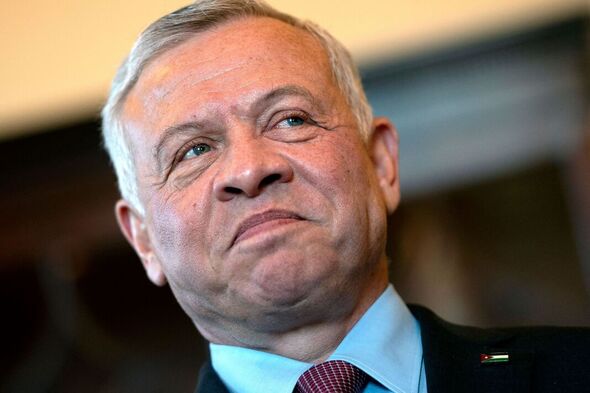King of Jordan “Takes to the Streets” in Disguise To See What Goes on in His Country, Not Trusting the Civil Service To Tell Him the Truth

King Abdullah II of Jordan ascended the throne in February 1999 following the death of his father, King Hussein. Just weeks before Hussein’s death, he had named Abdullah as his heir apparent, transferring the responsibility from his brother to his eldest son, who had been expected to spend his life in the military. Following his accession, Abdullah proclaimed his wife Rania as Queen. They have since been lauded as a “modern” King and Queen, leading their prosperous, historic Arab kingdom while remaining “true citizens of the 21st century”.
In 2019, Jordan’s royal family were the focus of an episode of 60 Minutes Australia entitled The Modern King and Queen of Jordan, Abdullah and Rania, during which the couple discussed their unexpected journey to the throne and how life had changed since becoming King and Queen.
Interviewer Liz Hayes said: “The Hashemite Kingdom they represent may date back 600 years, but King Abdullah and Queen Rania are true citizens of the 21st century, the most public and articulate of the new generation of Arab rulers.”
Queen Rania said: “We work as a team. It’s not a matter of just sitting in a role and saying that you represent your country, in order to really represent it, you have to get to know what the issues are and really try to address them. I think that that is a responsibility. And in fact, it’s an opportunity to make a change — to bring about a positive advancement in the country.”
As the documentary revealed, King Abdullah has his own, unique way of “keeping in touch” with his country’s citizens. The King frequently goes out and mingles with “his people” dressed in disguise.
He explained: “Well, I don’t trust people to make reports because people want to tell you what you want to hear. So if there is a problem, the best thing is to go out and see it for yourself.”
Ms Hayes added: “It’s a two-fold thing: one to get back out on the streets and just see what happens out there. But also to check up on what is [happening].”
Abdullah interjected: “…basically to check [it] out because I think the message was to the civil servants — that I don’t think treats the general public as well as it should — [to] be careful because the person across the counter may be me, and to keep them on their toes.”
In August 1999, just months after his accession, Abdullah “posed as a commoner” in order to mingle with people outside of the Palace.
At the time, the Washington Post reported: “The Stealth King has struck again. No one knows where he’ll pop up next — or in what disguise…
“At least twice in the past two weeks, between his regular appointments with statesmen and courtiers, King Abdullah has slipped out of the cool provinces of his palace, posed as a commoner, mingled incognito with his subjects and inspected the workings of his troubled realm.”
The report described the King’s “first undercover jaunt” earlier that month, which saw Abdullah don a “traditional long white robe, a red-and-white checked headdress” and a “scraggly white beard”
He posed as a television producer and was accompanied by a cameraman and a ‘reporter’, who was in actual fact his press secretary, into Jordan’s state-run trade zone. There, he got an “earful from merchants about red tape and inefficiency”.
When Abdullah was pressed to provide a permit to film, he removed his disguise and revealed his true identity — “to the general astonishment and delight of all”.
A few days later, in a bid to assess the performance of traffic police and hear passengers’ complaints, the King was driven around in a taxi by an aide.
His undercover stunts were an “apparent attempt to emulate the deft common touch of his widely beloved father and to provide himself with a populist shot in the arm”.
They also have roots in Arab culture, harking back to the 8th-century Islamic Empire which supposedly saw caliphs such as Harun ar-Rashid wander the streets in disguise in an attempt to solicit the opinions of their subjects.
“An Arab king moving incognito among his subjects seems to make perfect sense to Jordanians,” reported the Washington Post. “Also, harking back to Arab glory days cannot but help a young king who has spent a large part of his life outside the Arab world.”
Abdullah was born to a British mother and was educated in the UK and the US. Before unexpectedly succeeding his father, the King was an army general and had a promising military career ahead of him.
He did not anticipate ascending the throne, nor was he groomed for it. But, perhaps aided by his clandestine forays, Abdullah seemingly won over the public, with Jordanians giving him rave reviews.
Muhammad Dourmi, a security guard at the trade zone at the time of the King’s surprise visit, told the Washington Post: “He didn’t want to just hear things; he wanted to see things for himself.”
And 20 years later, in 2019, the King was continuing his covert outings. In September of that year, it was reported that Abdullah had visited north Amman’s Department of Land and Survey while undercover.
The King is understood to have wanted to take a firsthand look at the quality of services provided to the public. During the visit, Abdullah reportedly listened to the concerns of citizens and the department’s employees.




